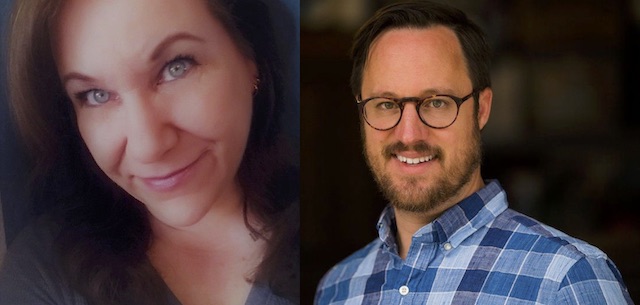We have another Young & Hungry couple on our radar.
Connie O’Donahue is a Sundance Episodic Story Lab Fellow currently living in Riverton, Wyoming, where she works for Wyoming PBS and radio station KCWC. Winner of the 2018 New York Television Festival (with her writing partner Jeremy Nielsen), Official Artist of the 2015 New York Television Festival, and alumna of the ABC Daytime Writers Development Program, her feature screenplays have garnered awards from the Austin Film Festival, Big Bear International Film Festival, Film In Arizona, and the Kairos Prize.
Jeremy Nielsen was stabbed in the face on the first day of his first real job. His current job is as a college professor at Central Wyoming College where he is the Associate Professor of Film. In a former life, Nielsen worked in film production as a cinematographer, shooting films that have played from the Los Angeles Film Festival to Slamdance, to every movie theater in South Korea one summer. A Sundance Fellow in the Episodic Story Lab, Nielsen was a finalist at the 2018 Austin Film Festival and his (and his writing partner Connie O’Donahue) script Ticker won the 2018 New York Television Festival.
How young and how hungry do you need to be to win a place on the 2018 Young & Hungry list?
Together, we decided to find a project to work on as a team. We initially wanted to create a show we could produce and film locally. Due to some unanticipated circumstances, that project never developed, but our working method did, so we went about creating a new idea, an idea that was free of the bounds of self-producing and strictly formed under the mantra of unique circumstance, populated with compelling characters.
After a brainstorm we had two ideas; a horse in a hazmat suit, and a traveling snake oil salesman. Through the effort of combining these ideas, we created Devil’s Due, a revisionist-history western, set in the 1950s. On a whim, we submitted it to and were accepted into the Sundance Episodic Story Lab. While there we received tutelage from some of the industry’s most successful and creative showrunners and writers.
Our story developed into a piece that featured our unique voice, born from our experiences and geography. We followed that up with Ticker, a dystopian drama that explored the lengths people are willing to go to in order to survive after the collapse of the global economy. That one seems to have struck a chord with people, especially in light of today’s staggering wage inequality and the growing gap between the haves and have-nots. Ticker was a finalist at the Austin Film Festival and won Best Dramatic Pilot at the New York Television Festival.
What personal qualities do screenwriters need to make it?
Why did you decide to become a screenwriter above all other careers?
How do you become agent/manager bait?
Where do you get your creative inspiration?
How do you decide which ideas are worthy of pursuing?
Do you have a writing brand in terms of interests you gravitate towards?
How do characterize the current state of the industry and opportunities for emerging writers?
How do you train and improve your writing craft?
What are the qualities of scripts you read that don’t get industry interest?
What advice do you have for screenwriters wanting to make next year’s Young & Hungry list?
What is something that few people know about you?
